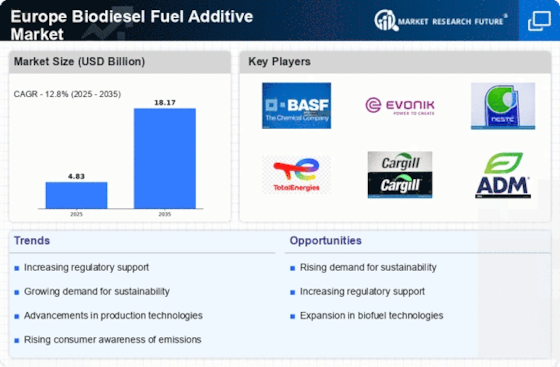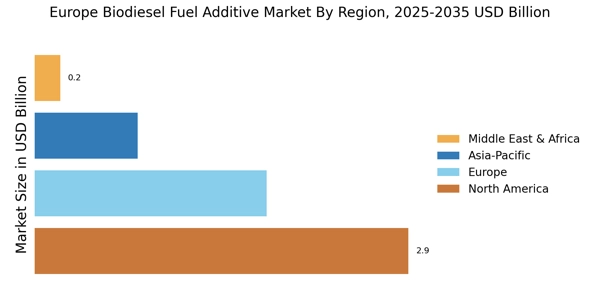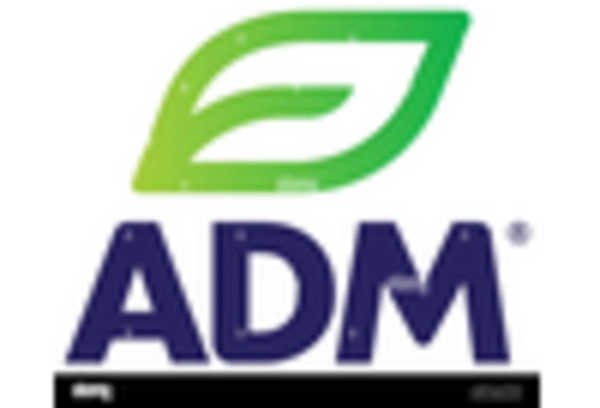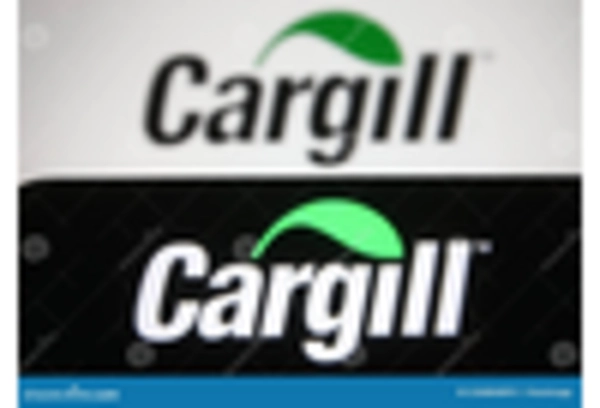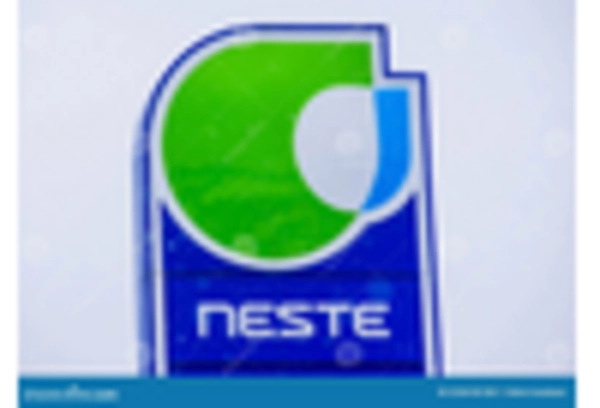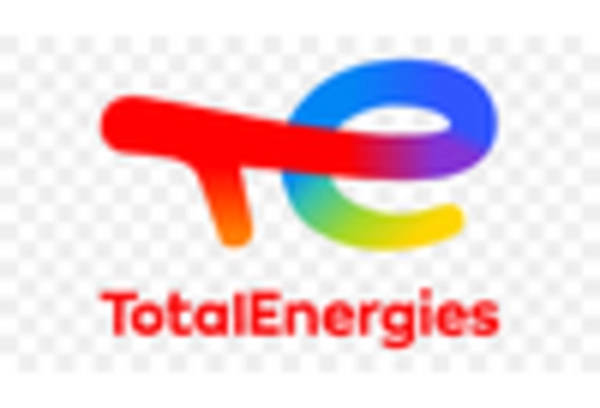Rising Environmental Awareness
The growing awareness of environmental issues among consumers and businesses is a significant driver for the Europe Biodiesel Fuel Additive Market. As climate change concerns escalate, there is a marked shift towards sustainable energy solutions. Consumers are increasingly seeking eco-friendly alternatives to fossil fuels, which has led to a surge in demand for biodiesel. In 2025, biodiesel consumption in Europe reached approximately 15 million tons, reflecting a robust growth trajectory. This trend is further supported by corporate sustainability initiatives, where companies are adopting biodiesel to meet their environmental goals. The increasing preference for renewable energy sources is likely to bolster the demand for biodiesel fuel additives, as they enhance the performance and sustainability of biodiesel fuels. Consequently, the heightened environmental consciousness is expected to propel the Europe Biodiesel Fuel Additive Market forward.
Economic Viability of Biodiesel
The economic viability of biodiesel as a competitive fuel alternative is a crucial driver for the Europe Biodiesel Fuel Additive Market. With fluctuating oil prices and increasing energy demands, biodiesel presents a cost-effective solution for many consumers and businesses. The European biodiesel market has shown resilience, with production costs decreasing due to advancements in technology and economies of scale. In 2025, biodiesel was reported to be approximately 10% cheaper than conventional diesel in several European countries, making it an attractive option for fleet operators and consumers alike. This economic advantage is likely to stimulate further investment in biodiesel production and the associated fuel additives, as stakeholders seek to capitalize on the growing market. Therefore, the economic feasibility of biodiesel is expected to be a driving force in the Europe Biodiesel Fuel Additive Market.
Support from Agricultural Sector
The agricultural sector's support for biodiesel production is a notable driver of the Europe Biodiesel Fuel Additive Market. Many European countries have established policies that promote the use of agricultural feedstocks for biodiesel production, such as rapeseed and sunflower oil. This not only provides farmers with an additional revenue stream but also contributes to rural development. In 2025, the European Commission reported that over 60% of biodiesel was produced from domestic feedstocks, indicating a strong reliance on local agriculture. This synergy between agriculture and biodiesel production enhances the availability of raw materials for fuel additives, thereby fostering market growth. As the agricultural sector continues to embrace biodiesel, the demand for effective fuel additives that optimize performance and sustainability is likely to increase, further driving the Europe Biodiesel Fuel Additive Market.
Regulatory Framework and Incentives
The Europe Biodiesel Fuel Additive Market is significantly influenced by the regulatory framework established by the European Union. Policies aimed at reducing greenhouse gas emissions and promoting renewable energy sources have led to increased adoption of biodiesel. The Renewable Energy Directive (RED II) mandates that at least 14% of energy consumed in the transport sector must come from renewable sources by 2030. This regulatory support not only encourages biodiesel production but also enhances the demand for fuel additives that improve performance and stability. Furthermore, various member states offer financial incentives for biodiesel production, which further stimulates market growth. As a result, the regulatory landscape appears to be a crucial driver for the Europe Biodiesel Fuel Additive Market, fostering innovation and investment in this sector.
Technological Innovations in Additives
Technological advancements play a pivotal role in shaping the Europe Biodiesel Fuel Additive Market. Innovations in additive formulations have led to improved fuel efficiency, reduced emissions, and enhanced engine performance. For instance, the development of multifunctional additives that not only enhance fuel properties but also provide cleaning and anti-corrosion benefits is gaining traction. According to recent data, the introduction of advanced additives has the potential to increase biodiesel's market share in the overall fuel market. Moreover, research and development initiatives funded by both public and private sectors are likely to yield new solutions that address the challenges associated with biodiesel, such as cold flow properties and oxidation stability. Thus, the continuous evolution of technology in additive development is expected to drive growth in the Europe Biodiesel Fuel Additive Market.


